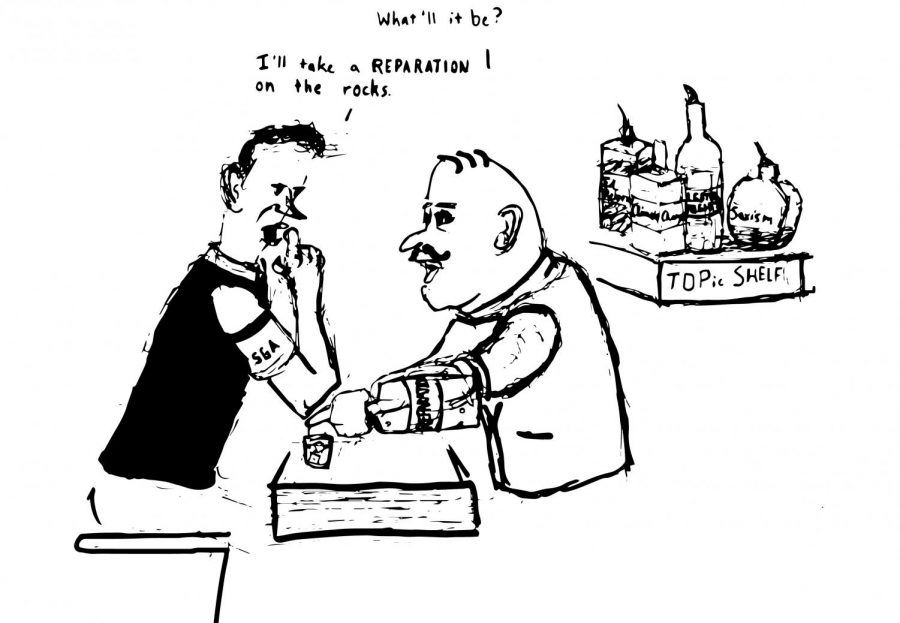Regarding Reparations: SGA resolution hinders chance of future discussions
April 24, 2017
The Issue: The Student Government Association passed a resolution to support reparations for all black students, inciting controversy on and off campus.
Our Stance: SGA has treated reparations as a publicity stunt in hopes of holding a conversation they’re unsure of; seriously affecting their credibility and potentially the loss of serious discussion.
The entire universe seemingly took notice of our Student Government Association after the passage of Resolution 6-17-S “Resolution to Support Reparations.” The story was picked up by The Blaze, Fox News, Associated Press, New York Post, Rush Limbaugh and even Milo, guy whose last name would get you a lot of points in Scrabble, Yiannopoulos.
As the Herald first reported, the resolution aims to: send a message to the university to acknowledge slavery as “a debt that will never be paid,” calls for a special task force be established to research test-optional admissions, meaning ways to apply without using an ACT or SAT score, geographically-weighted admissions and for all black people to have full and free access to WKU.
President Gary Ransdell later issued a statement saying he appreciated the interest taken by SGA in such issues but wanted to clarify SGA’s resolution is not an official position adopted by WKU nor would WKU adopt any such policy.
Many took to our online comments section to express their oft overtly racially charged and historically inaccurate opinions on the matter.
So, firstly, no, the Irish were not also slaves.
Yes, while free blacks did own slaves, as Henry Louis Gates Jr., director of the Hutchins Center for African and African American Research at Harvard University, writes in The Root, this does not somehow excuse the practice or institution of slavery; two wrongs don’t make a right.
As Marcus Rediker, distinguished professor in the department of history at the University of Pittsburgh, writes in his book “The Slave Ship: A Human History” slavery was “an ancient and widely accepted institution” throughout larger African societies, but the institution also came to be further empowered and exacerbated by European colonists.
If you learn anything from this let it be that history is more complex than you’d like to believe or admit.
The resolution authors, Andrea Ambam and Brian Anderson, have said the “language used in the resolution was largely symbolic, and they did not expect free tuition for WKU’s black students in the near future.”
“This is something that I think is more importantly about sending a clear message than it is about actually trying to strive for the institution to actually give out free tuition to everybody,” Anderson told the Herald.
Similar claims were echoed by Anderson in a letter to the editor and by SGA President Jay Todd Richey in a statement on Facebook. All of them say they want to begin a conversation about making college more affordable and “sending a clear message.”
But whatever message they were trying to send has been marred and spit out by what on the surface appears to be no more than a publicity stunt achieved through an irresponsible use of legislative petitioning.
Their use of reparations as a sort of trojan horse for some vaguer broad conversation has not only made some question the credibility of SGA but also removes the legitimacy of the argument for reparations, which as Anderson noted, is well thought out by author Ta-Nehisi Coates. Reparations weren’t even the primary concern for the resolution authors, just something to grab people’s attention.
Meaning the authors were not committed to their outlined goal of free tuition for black students to begin with. It’s entirely possible they could have made a strong, well-reasoned argument for their side, but they conceded it immediately. Don’t come into the ring if you’re not ready to fight for your side; it does a disservice to those who continue to fight for reparations.
People’s attentions have been thoroughly grabbed, so now what? What is this conversation we’re going to have? Because, there is one to be had. One cannot deny the effects of slavery can still be felt today. The loss of land, the theft of finances, the refusal of loans for housing, stripping the right to vote, the doctrine of separate but equal and the ever booming prison industry.
These things do not just happen, they’re cultivated. After the failure of Reconstruction, this country turned to a racial form of terrorism known as lynching, and ever since then, we’ve gotten less public and more sly with how we treat black individuals. Slavery still permeates, we’ve just learned to call it different names. So it should not be too big of a hurdle to come to the conclusion that black students face different barriers and hurdles than other students, even considering similar economic standings.
WKU is no stranger to racial incidents either. Just last semester, a black student’s car was vandalized with a racial slur and an associate professor received threatening notes, which used racist language. Additionally, the university cannot simply ignore how in 1963 the African-American community of Jonesville was destroyed through an Urban Renewal Project so WKU could encroach upon the land where the community once thrived.
There should be nothing controversial associated with discussions about affordable higher education, the achievement gap between majority and underrepresented students or addressing issues of diversity and inclusion here at WKU. These are issues worthy of discussion, of open debate, and reparations are as well, mind you. We cannot place a cap on what should or should not be discussed in the chambers of SGA or the hallways of WKU.
However, we hope SGA has cherished its 20 minutes of fame because while you all have done admirable work in the past on issues of race and diversity, we envision any conversation you wish to have from this point on to be an uphill battle.

























